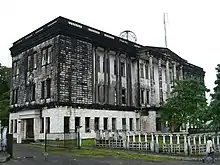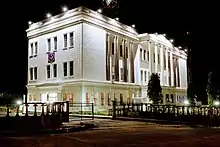Masonic Order of Liberia
The Grand Lodge of the Republic of Liberia is a fraternal organization based on the principles of Prince Hall Freemasonry. Prior to 1980, its membership tended to consist of Americo-Liberians and it was influential within the ruling True Whig party from its founding until the coup of Samuel Doe in 1980, when much of its senior leadership was killed and the new military regime banned masonic activities in the country.
| Part of a series on |
| Freemasonry |
|---|
 |
History
Origins
Among the settlers that arrived in 1822 to the future Republic of Liberia, were a few freemasons hailing from Negro lodges in the United States of America that were founded by Prince Hall.
After the lapse of a period extending over forty years, the surviving Masons, who included a number of past Presidents and Vice Presidents of Liberia, felt that the time had arrived for the formal organization of Craft Masonry in Liberia. In 1867, Thomas Amos, Joseph Jenkins Roberts, Beverly P. Yates, Charles B. Dunbar, Sr., F. Johns, John N. Lewis, John H. Chivers, James C. Minor, John Seys, James M. Priest, Samuel C. Glassgow, William S. Anderson and Gabriel Moore, assembled a convention in Monrovia, at which it was decided that Thomas Amos would spearhead the establishment of a Grand Lodge in Liberia. Subsequently, the necessary dispensation was acquired to launch Oriental Lodge No. 1 in Monrovia "to Enter, Pass and Raise Free-masons according to the ancient customs and usages of the Craft." Similar dispensations were also granted for the erection of two other lodge, now known as Saint Paul Lodge No. 2 of the Clay-Ashland Settlement, and Saint John’s Lodge No. 3 also of Monrovia.
Having the requisite lodges to create a Grand Lodge, a second Convention was held in Monrovia to draw up a constitution with certain by-laws. Elections also occurred and the elected officers were installed as follows:
- Thomas H. Amos, as Grand Master
- Ashbury F. Johns, as Deputy grand Master
- Beverly P. Yates, as Senior Grand Warder
- H. W. Johnson, as Junior Grand Warden
- Gabriel Moore, as Grand Treasurer
- John N. Lewis, as Grand Secretary
The formation of the Grand Lodge of the Republic of Liberia was announced with the following words:
We be masons, true and loyal, having the interest and prosperity of the Fraternity at heart; and being desirous of diffusing its genuine principles broadcast, have constituted and set up a Grand Lodge of Free and accepted Masons in and for Republic of Liberia and ask the sympathy and recognition of the Craft throughout the Globe.
This appeal met the positive response of most of the Masonic Grand Bodies of the World, namely:
- Grand Lodge of England
- Grand Lodge of Scotland
- Grand Lodge of Australia
- Grand Lodge of New Zealand
- Grand Lodge of Belgium
- Grand Lodge of Chile
- Grand Lodge of Haiti
- Grand Lodge of Germany
- Grand Lodge of Hamburg
- Grand Lodge of Hungary
- Grand Lodge of Spain
- The Grand Orient of France
- Grand Lodge of Berlin
- Grand Lodge of Victoria
- Grand Lodge of Italy
Expansion and political dominance

The Grand Lodge of Liberia was founded in 1867.[1] By the 1970s there were 17 subordinate lodges and the majority of Liberia's high-ranking officials were Masons.[1] Matters of state were widely believed to have been decided from within the lodges.[1] Being a Mason was a veritable prerequisite for positions of political leadership in the True Whig Party.[1] Liberia's Masons were criticized for their influence as well as for the exclusion of indigenous Liberians from their ranks.[1]
Prohibition and reinstatement

After Master Sgt. Samuel Doe assumed leadership in a coup d'etat in 1980, Liberia's masons faced violent retribution.[2] The President of Liberia and the order's Grand Master, William R. Tolbert, Jr., was overthrown and killed in the coup.[3] Freemasonry was banned by Doe in 1980, which caused the Grand Lodge's influence in Liberia to greatly diminish. President Doe, who later desired to become a Mason, lifted the ban on Masonic activities which led to the convening of a special Prince Hall meeting held in New Orleans in 1987 to elect a new Grand Master. This was followed by a meeting in Monrovia in 1988 when Freemasonry was formally reinstituted. President Doe was subsequently initiated in 1989.[3]
In 1990, Samuel Doe in turn was murdered by Prince Johnson, one time ally of Charles Taylor, in an internationally televised display. To prove that Doe was not protected by black magic, his ears were cut off, then some of his fingers and toes, and finally he was murdered by decapitation and buried (his body was later exhumed and reburied). The spectacle of his torture was videotaped and seen on news reports around the world. The video shows Johnson sipping a beer and being fanned by an assistant as Doe's ear is cut off.
During and after the civil war

During the First Liberian Civil War, the Grand Masonic Temple in Monrovia was the scene of many battles,[4] and its ruins became home to thousands of squatters.[5] On trial, President Charles Taylor made light of allowing his troops to post human heads and skulls of enemies at checkpoints, saying it was no worse than the display of skulls in “Western fraternal organizations.” [6]
The Masons evicted squatters from the Grand Lodge by 2005,[5] and the Masonic Temple has resumed to hold meetings for the subordinate Lodges in the Blue Lodge Room, quarterly Grand Communications in the Grand Lodge room as well as meetings for the Order of Eastern Star and its subordinate Chapters in their respective rooms within the Temple. According to the Grand Lodge's 2015 reports, there are 19 Subordinate Lodges in Liberia with a total membership of 1,750.[7] Benoni Urey, a Freemason who is considered Liberia’s richest man and a possible candidate for the Liberian presidency, has said he wants to see the Masonic Order of Liberia return to prominence in Liberian politics.[8]
List of Grand Masters
- Thomas H. Amos (1867–1869)
- Joseph Jenkins Roberts (1869–1872)
- Beverly L. Yates (1872–1874)
- Charles B. Dunbar Sr. (1874–1876)
- Reginald A. Sherman Sr. (1876–1879)
- William M. Davies (1879–1889)
- Charles T. O. King (1889–1901)
- Alfred Benedict King (1901)
- Hilary W. Travis (1901–1908)
- William David Coleman (1908)
- A. Benjamin Stubblefield (1908–1916)
- Charles B. Dunbar, Jr. (1916–1920)
- Charles D. B. King (1920–1929)
- Nathaniel H. B. Cassell (1929–1931)
- William Oliver Davies-Bright (1931–1933)
- Joseph Samuel Dennis (1933–1934)
- John C. A. Gibson Sr. (1934–1936)
- Joseph Fulton Dunbar Sr. (1936–1941)
- Anthony Barclay (1941–1943)
- Louis Arthur Grimes (1943–1946)
- Clarence Lorenzo Simpson Sr.
- William V. S. Tubman Sr.
- Christian Abayomi Cassell
- Charles T. O. King II
- Richard AbromHenries Sr.
- Frank E. Tolbert Sr.
- William R. Tolbert Jr.
- McKinley A. Deshield Sr.
- E. Jonathan Goodridge
- James E. Greene
- S. Alfred P. Harris Sr.
- E. Reginald Townsend
- Philip J. L. Brumskine
- George E. Henries
- James Elijah Pierre 33°
- Anthony W Deline 33
References
- Monrovia – Masonic Grand Lodge
- Wauther, Claude (September 1997). "A strange inheritance". Monde Diplo. Retrieved 13 June 2015.
- The Tragic History of Freemasonry in Liberia, Chris Hodapp, Freemasonry for Dummies Blog
- Old Ruling Elite Making a Comeback in Liberia, Tim Sullivan, Associated Press, September 29, 2001.
- Liberia- No More War, Jessie Deeter, Frontline (PBS), May 2005.
- Hodapp, Chris (29 June 2015). "The Tragic History of Freemasonry in Liberia". freemasonsfordummies.blogspot.com. Retrieved 13 October 2015.
- "Grand Lodge of Liberia A.F.& A.M." Grand Lodge of Liberia. Archived from the original on 6 December 2015. Retrieved 12 October 2015.
- Yates, Charles (29 June 2015). "Presidential Candidate Urey Wants Freemasons to Control Liberian Politics". Bushchicken.com. Retrieved 13 October 2015.